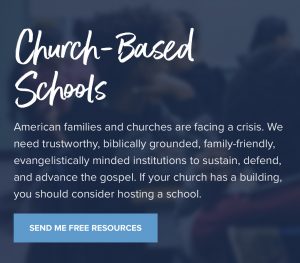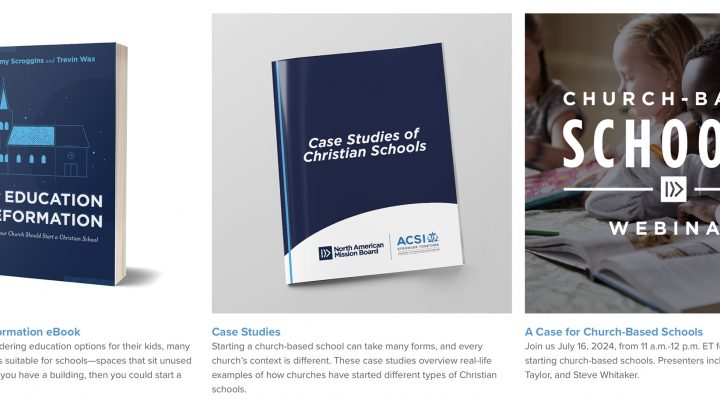The Southern Baptist Convention’s church planting agency now has a program devoted to encouraging churches to start Christian schools in their buildings.
In a promotional video posted on the website of the SBC North American Mission Board, a spokesman declares: “If ever there were a time to establish Christian schools, the time is now.”

Trevin Wax
Trevin Wax, vice president of resources and marketing at NAMB, is the frontman for the video. He explains: “Parents all over the country are actively considering education alternatives for their kids. Meanwhile, so many churches have buildings suitable for schools, education spaces that sit unused throughout the week. If you have a building, then you can host a school in partnership with your church. That’s why we’ve created resources to help you think through starting a church-based school, because we believe that the witness of these schools could lead to culture change through an evangelistic harvest, a powerful education reformation.”
Prior to the “conservative resurgence” in the last 20th century, the SBC was known as a staunch ally and advocate for public education. Unlike Roman Catholics, Episcopalians and Missouri Synod Lutherans, most Southern Baptist churches eschewed calls for church-based schools, believing they could have a greater influence inside public schools than outside them.
Many a Southern Baptist pastor’s wife has been a public school teacher — a job easily movable from town to town and a public service that often aligns with a pastoral calling. Among Baptists, only the most conservative and independent churches routinely started Christian schools, and that most often was done in response to desegregation.
In 1999, as the conservative movement reached peak influence, messengers to the SBC annual meeting adopted a “Resolution On Christian Schools” that signaled the coming change in attitudes.
That resolution said, “American families and churches face competing worldviews” and “many secular worldviews are in opposition to the truths of God’s word.” It declared children are exposed to those “secular worldviews” “through our nation’s institutions, media and humanistic curricula.”
The resolution commended Lifeway Christian Resources for publishing “curricula designed to teach children and youth from a biblical perspective.”
It called on “all Southern Baptist churches to consider carefully how they can help meet this need by supporting educational programs that follow biblical principles, whether they are implemented in Christian, private, public or home schools.”
In the intervening years, the home school movement and the Christian school movement both have mushroomed, while evangelical Christians also have sought to take over local school boards and state boards of education and influence textbook selections and library holdings.
Many of the SBC’s largest megachurches also run huge private schools, such as Prestonwood Academy at Prestonwood Baptist Church in Plano, Texas, which has the largest Christian school in the DFW Metroplex with nearly 1,600 students in grades Pre-K through 12.

From NAMB’s website
In 1979, the same year the “conservative resurgence” began, the Southern Baptist Association of Christian Schools was organized “by a group of educators at the Christian School Management Seminar hosted at the Southern Baptist Sunday School Board in Nashville, Tenn.,” the group’s website says. “Their intent was to create an associating body of Southern Baptist Christian schools.”
Today, that group is known as the National Alliance of Christian Schools. It supports “Christian schools and preschools, colleges and universities, home school communities, churches, educators and others who support the education of children through a biblical worldview.”
One year prior, in 1978, another group was formed, the Association of Christian Schools International, that today is the largest association of church-based private schools.
As BNG previously reported, COVID and the cultural wars of the MAGA era have created a boom in enrollment in private Christian schools.
NAMB’s website publicity echoes those factors. “American families and churches are facing a crisis,” it declares. “We want every evangelical church in America to consider starting a Christian school. If you have a building, then we encourage you to think about hosting a school in partnership with your church.
“When people encounter vibrant, dynamic, healthy, happy Christian families connected to a church and involved in a church-based school, many will be intrigued. We believe that the witness of these schools could lead to a deep and wide evangelistic harvest — a powerful education reformation.”
NAMB offers two books about starting church-based private schools and will host a July 16 webinar titled, “The Case for Church-Based Schools.”


